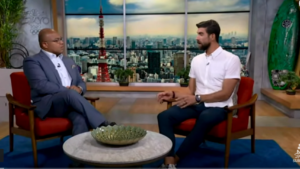“The Olympics,” tweeted the tweeter, “would be a hell of a lot more interesting if every event final included one random average dude. Just for comparison. Some guy who just finished his pizza and hopped up off the couch, and now he’s out there doing the thing.”
God I love the Twitter.
Just for comparison, it said. Just to show the rest of us how goddamn amazing it is — and how lucky we are to park our lazy, overcritical asses on the couch, watch, and complain — when someone performs at an elite level of sport.

(pizzamarketplace.com)
Imagine the entertainment, watching pizza dude fail a 3-foot high-jump. Waddle 100 meters down an Olympic track. Flail through a medley in the pool.
Or freeze up, choke, and vault headfirst into the mat.
The viewing experience would give us a little clue about something else too: there is just one person out of nearly 8 billion in the world who can do what Simone Biles can do. Just one.
And that person is Simone Biles.
She’s also the only person in this world with a grasp of exactly what’s happening in Simone Biles’ head. The only one. Not her fans, not her coaches, not USA Gymnastics, not Simone’s parents or her teammates or the judges.
And for sure, not the clown trolls on social media. Last week they put their pizza down long enough to call her weak, selfish, a crybaby, a choker. They claimed she let her team and her country down. They actually believe Simone Biles robbed America of our podium moment, our chance to stand up there with her for the anthem. Because God knows it was supposed to be our moment with her.
But they don’t know. Simone alone knows what caused her to pull herself from five events in Olympic competition. Simone doesn’t owe anyone anything. She has nothing to prove to anyone. If her mental state put her in physical danger, she did the right thing.
But too many of us expect her to use her courage and her experience and her confidence to erase all that. We demand that she hide all the ugly from us. We feel entitled, here on our couches back home, that Simone Biles must protect us from the knowledge that too many top athletes are created and abused, then tossed aside, by a system that is hideous and cruel and unforgiving to young people.
We want smiles and gold and excellence. We demand perfection, presented with exquisite taste, unpolluted by what happens in the meat factory, the blood, the injuries, the broken bodies and shattered minds.
Sally Jenkins writes in the Washington Post that USAG abandoned Simone in her moment of torment, and that it hasn’t stopped.
But we don’t give a damn about USAGym’s lack of support for their athletes. We rightfully pillory Larry Nassar and we glory in his prison sentence, but we don’t want the news that USAGym enabled the whole abomination, that the Karolyis let Nassar molest little girls right there at their ranch, that the FBI probe was a sham, or – maybe worst of all – that there’s been no substantive change in training culture.
We don’t really want a change, do we? If fans rose up and demanded it, it would happen. But we still watch the Olympics with our kids, we still let them dream of leotards and balance beams and swim teams and track meets. We still don’t tell them a thing about the pain and suffering and heartbreak along the way, and we still feed our own dreams of medals and our own demented belief that an abusive sports culture builds character and creates successful, well-adjusted adults. And we still hand off our children to coaches who twist their minds and take over their lives and demand perfection and devotion.
And then we wonder how so many kids get tossed on the trash pile by a culture that doesn’t give a damn about them. And we continue to believe it’s someone else’s fault. We continue to deny it’s on us for believing that abuse is good for children.
Michael Phelps, the most decorated swimmer in Olympic history with 23 gold medals, has been forthright about his own struggles. He and Biles, each in their own words this week, have reminded us that when you focus only on one thing – and in fact you become that thing – it may be the only way to the top, but when that thing is over, you have nothing. Nothing but emptiness and depression and no way out. All the admiration and praise from fans, even the countless dollars in endorsement deals, do nothing to change it.

In an interview with NBC’s Mike Tirico, Phelps speaks of the unbearable pressure, not just on him but on athletes at every level who face the same demons he did. And his support for Biles at this critical moment goes beyond personal caring for a fellow Olympian. He’s hopeful. “Maybe we’ll actually be able to help athletes. One of the things I’ve been most frustrated with is the lack of change and the lack of support we have for mental health,” Phelps says.
We’ll see. If that’s to happen then we’d better have the courage to take a good look at the blood and guts on the factory floor. And sadly that just seems pretty doubtful.
But meanwhile, back home on our couch…
“…in lane one of the Olympic final of the men’s 400 hurdles, it’s Bob Shaloski of Toledo…”
“Hey Edna, isn’t that our plumber?”
